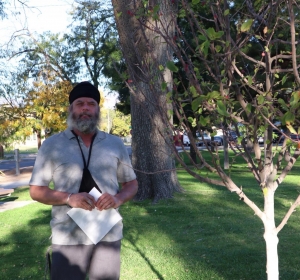New Mexico’s authority to set strong clean air, hazardous waste protections a matter for Our Common Home
By Sr. Rose Marie Cecchini, MM,
Office of Life, Peace, Justice & Creation, Catholic Charities of Gallup Diocese
We live in a beautiful state. We live in a place where ancient and alive cultures continue to teach and remind us that we must care for sacred land, water and our communities. We are to care for our brothers and sisters and Our Common Home. There is wisdom in these ethical values, and yet we are not listening.
For too long, antiquated state laws have limited the regulatory tools available to protect communities from rising threats to our air quality, to our drinking water and our climate. The state and local agencies tasked with protecting our health are hampered by laws that don’t allow them to adopt regulations that are stronger than federal standards.
That’s a problem, especially considering the federal government has rolled back or eliminated dozens of public health and environmental protections over the last four years. New Mexico’s air quality is deteriorating and recent news stories have focused on public health threats from contamination of our groundwater and a legacy of environmental contamination. Pollution poses a serious threat to the health of all New Mexicans but the impacts are not equal – children, Native Americans and those living in poor, rural communities are hardest hit. These are our brothers and sisters. State environmental agencies need the authority necessary to address urgent challenges including the legacy of abandoned, unremediated uranium mine sites, exposing communities to radioactive contamination of water, land and air; the Delaware-size methane cloud over the Four Corners area of the state impacting climate change.
But we are always given opportunities to begin afresh. This past week, the Senate Finance Committee voted to move Senate Bill 8 forward. SB 8 would empower the Environmental Improvement Board and local air quality boards to better respond to the problems associated with industrial waste and pollution and adopt critical pollution and hazardous waste regulations that go beyond federal standards.
In New Mexico we do have the power to care for one another. We simply cannot rely on the federal government to make the right decisions for us, and our local and state agencies should have the authority to adopt strong public health and environmental protections now for our communities and future generations to come.
In addition to allowing stringent air quality standards, SB 8 would allow the state to consider strong, enforceable limits on emerging groundwater pollutants such as PFAS. According to the New Mexico Environment Department, there is “evidence that exposure to some PFAS chemicals can lead to adverse health effects such as increased cholesterol, reproductive problems and cancer.” PFAS are found in a wide variety of products “including food packaging, nonstick pans and aqueous film forming foams (AFFF) used to extinguish fuel-based fires.”
Senate Bill 8 also would strengthen cleanup standards at polluting facilities like the hazardous waste deposited around Los Alamos National Lab from plutonium processing where local officials worry they don’t have standards necessary to protect drinking water. And it would allow the state to address cleanup at other sites, such as Sandia National Laboratories and Kirtland Air Force Base.
We appreciated Senate Finance moving this bill forward. Gallup residents and communities across New Mexico will benefit greatly from public health protections that will be made possible by Senate Bill 8. It is our moral and ethical responsibility to be good neighbors to one another. We call on the State Senate and House to approve Senate Bill 8 as soon as possible and give New Mexico the authority and flexibility it needs so that we can choose life with dignity, health, right livelihood and care for our communities.

